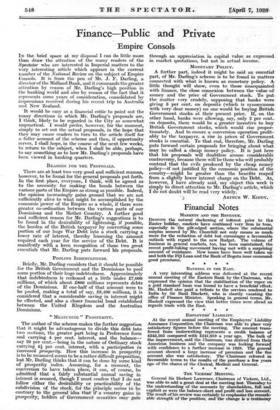Finance—Public and Private
Empire Consols
IN the brief space at my disposal I can do little more than draw the attention of the many readers of the Spectator who are interested in Imperial matters to the very interesting article which appears in the current number of the National Review on the subject of Empire Consols. It is from the pen of Mr. J. F. Darling, a director of the Midland Bank, and it commands the greater attention by reason of Mr. Darling's high position in the banking world and also by reason of the fact that it represents some years of consideration, consolidated by impressions received during his recent trip to Australia and New Zealand.
It would be easy as a financial critic to point out the many directions in which Mr. Darling's proposals are, I" think; likely to be regarded in the City as somewhat impractical. I would prefer, however, for the moment, simply to set out the actual proposals, in the hope that they may cause readers to turn to the article itself for a. fuller account of the scheme and then, if opportunity serves, I shall hope, in the course of the next few weeks, to return to the subject, when I shall be able, perhaps, to say something as to how Mr. Darling's proposals have been viewed in banking quarters.
REASONS FOR THE PROPOSALS.
There are at least two very good and sufficient reasons, however, to be found for the general. proposals put forth. In the first place, everyone,., I think, will be agreed as to the necessity for making the bonds between the various parts of the Empire as strong as possible. Indeed, the opinion increasingly gains ground that we are not sufficiently alive to what might be accomplished by the economic power of the Empire as a whole, if there were greater co-ordination between the various parts of our Dominions and the Mother Country. A further good and sufficient reason for Mr. Darling's suggestions is to be found in the desirability of lightening, if possible, the burden of the British taxpayer by converting some portion of our huge Wax Debt into a stock carrying a lower rate of interest, thereby lessening the amount required each year for the service of the Debt. It is manifestly with a keen recognition of these two great essentials that Mr. Darling puts forward his proposals.
POOLING INDEBTEDNESS.
- Briefly, Mr. Darling considers that it should be possible for the British Government and the Dominions to pool some portion of their huge indebtedness. Approximately that indebtedness is reckoned at a little under £7,000 millions, of which about £800 millions represents debts of the Dominions. If one-half of that amount were to be pooled, making a total of say, £3,400 millions, it is considered that a considerable saving in interest might be effected, and also a closer financial bond established between the United Kingdom and the Australian Dominions.
MEASURLNG " PROSPERITY.
The author of the scheme makes the further suggestion that it might be advantageous to divide this debt into two sections, the greater part being in Preference form and carrying 4 per cent. interest, and the balance— say 20 per cent.—being in the nature of Ordinary stock carrying 4} per cent. interest, with a participation in increased prosperity. How this increase in prosperity is to be measured seems to be a rather difficult proposition, but Mr. Darling thinks that it can be done by some kind of prosperity index. Assuming, for a moment, the conversion to have taken place, it can, of course, be admitted that a fairly substantial annual saving in interest is secured, though I must confess that I do not follow either the desirability or practicability of the subdivision of the stock, for the principle seems to be contrary' to the general idea that if a -country gains in prosperity, holders of Government securities may gain
through an appreciation in capital value as expressed i in market quotations, but not in actual income.
MONETARY POLICY.
A further part, indeed it might be said an essential part, of Mr. Darling's scheme is to be found in matters connected with what is known as monetary policy. A little thought will show, even to those unacquainted with finance, the close connexion between the value of money and the price of Government stock. To put the matter very crudely, supposing that banks were giving 5 per cent. on deposits (which is synonymous with very dear money) no one would be buying British Government stocks. at their present price. If, on the other hand, banks were allowing, say, only 2 per cent.. on deposits, there would be a greater incentive to buy British Government stocks, which would rise propor- tionately. And to ensure a conversion operation profit- ably to the taxpayer, a rise in prices of Government stocks is essential. To that end, therefore, Mr. Darling puts forward certain proposals for bringing about what may be called a cheap money policy. It is just here that his proposals will doubtless arouse considerable controversy, because there will be those who will probably contend that the evils produced by the cheap money policy—if not justified by the economic position of the country—might be greater than the benefits reaped from a slightly lower interest charge on the Debt. As, however, I have already said, my object this week is simply to direct attention to Mr. Darling's article, which I do not doubt will be read very widely.
ARTHUR W. KIDDY.






































 Previous page
Previous page